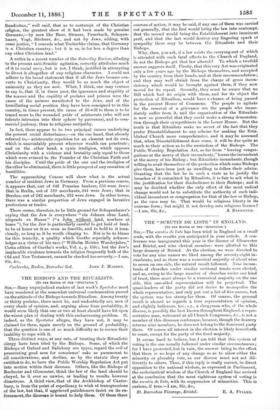THE " SCRITIIN DE LISTE " IN ENGLAND.
[To MR EDITOR OF TEE "SPECTATOR."( SIR,—The 8Critii76 de lists has been tried in England on a small scale, with the results you anticipated in your article. A con- ference was inaugurated this year in the diocese of Gloucester and Bristol, and nine clerical member v were allotted to this large deanery of Bristol. At the election, we were directed to vote for any nine names we liked among the seventy-eight iu- cuxnbents, and as there was a numerical majority of about nine to seven on one side, the natural result followed. Nine incum- bents of churches under similar sectional trusts were elected, and as, owing to the large number of churches under one kind of trust, there must always be a numerical majority on the one side, this one-sided representation will be perpetual. The quasi-leaders of the party did not desire to monopolise the whole representation, and only put out a list of five names, but the system was too strong for them. Of course, the general result is absurd as regards a true representation of opinion, and slightly ludicrous, too ; e.g., a clergyman who, of the whole diocese, is possibly the best known throughout England, a repre- sentative man, welcomed at all Church Congresses, &c., is not a, member of this diocesan conference, because, though the deanery returns nine members, he does not belong to the dominant party there. Of course all interest in the election is likely henceforth to cease, except for the party of the fixed majority.
It seems hard to believe, but I am told that this system of voting is the one usually followed under similar circumstances ; for I have protested, but in vain, the answer being to the effect that there is no hope of any change so as to allow either the minority or plurality vote, as our diocese must not act dif- ferently to others. Thus, if this reply is really correct, in direct opposition to the national wisdom, as expressed in Parliament, the ecclesiastical wisdom of the Church of England has arrived at the conclusion that the most righteous system of voting is the &rutin de lists, with its suppression of minorities. This is curious, if true.—I am, Sir, &c., St. Barnabas Vicarage, Bristol. E. A. FULLER.






































 Previous page
Previous page